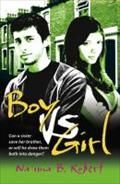by Seemi Aziz, Oklahoma State University, Stillwater, OK

This novel presents consequences of immigration on second generation children. The story revolves around twin teenaged brother and sister of Pakistani decent. Farhana is the sister and Faraz the brother. They are born in U.K. to parents who migrated and are not well educated. They run a small shop. Mom is a stay at home mother. They live amongst the extended family of grandmother and aunts and uncles. Both siblings are juggling the balance of tradition/religion along with their lived experiences of modernity/westernization feel disconnected with the 1st generation except for an aunt who grew up and was educated in England and seems to have found herself in the process. This aunt is deemed too religious by the rest of her family, as she wears the ‘hijab’ not traditional to Pakistan.
The issues faced by sibling are very real. This novel has a good combination of good and bad Muslim youth. Where there is a representation of the norm of the sibling’s behaviors there is also a constant comparison being provided of how other Muslim teenagers are acting/behaving. There is an ultra modern Rubina interacting with a whole gang of Muslim youth, led by Sakrooz, that are territorial and fighting with other gangs. Faraz is tempted to join it. He is presented as effeminate as he is ‘pretty’ with green eyes and into art. This connects back to No Safe Place’s two male protagonists. Both of them were into music and thus being oppressed by their counterparts in Iraq and Russia. They were running to England where there passion was not looked down on. Faraz was pushed into joining Sakrooz’s gang against his better judgment as he wants to get back at the kids picking on him.
Personal/religious struggles are put front and center. The beginning of Ramadan signals a turn in the characters and the habits of the sibling. They vow to follow through in the real meaning of fasting rather than focusing on the merely lack of food and water. The aunt’s character is influential as the modern religious role model who knows how to live in her boundaries and is open and broadminded. She likes someone not from the culture and brings the matter to the family even though she realizes that the path is going to be hard. Farzana struggles with her choice of wearing a ‘hijab’ even though her family has objected to her wearing it. She falls for Malik and does not want to marry the ‘good’ cousin from Pakistan that her parents seem to have chosen for her.
In this whole process the disconnect between the parents and the kids is very prominent and culturally unnatural. The author, who is not from the culture, does mange to present some struggles well but there seems disconnected at other points.
Journey through Worlds of Words during our open reading hours: Monday-Friday, 9 a.m. to 5 p.m. and Saturday, 9 a.m. to 1 p.m. To view our complete offerings of WOW Currents, please visit archival stream.
- Themes: Boy vs. Girl, Seemi Aziz
- Descriptors: Books & Resources, Debates & Trends, WOW Currents
